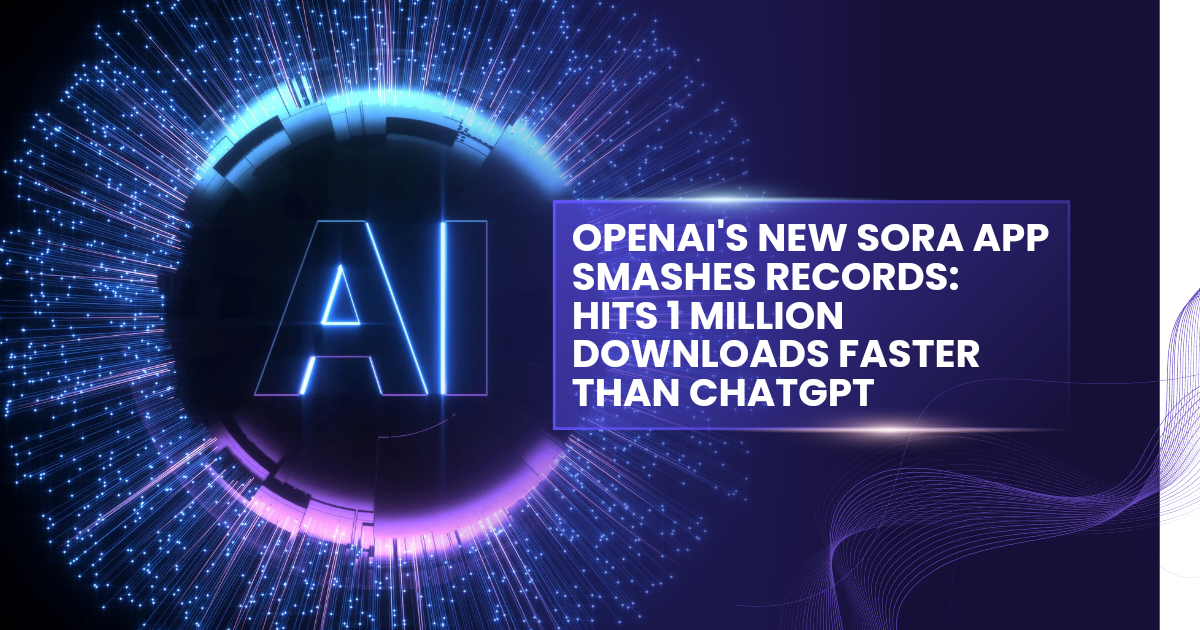OpenAI’s groundbreaking text-to-video AI tool, Sora, is an instant viral success, crossing the one million downloads milestone in under five days. This blistering adoption rate is faster than the initial launch of ChatGPT, signaling a monumental surge in demand for generative AI video technology.
Despite its current invite-only status and limited availability, the OpenAI Sora app for iOS has rapidly soared to the top of the App Store charts. The unprecedented speed of adoption highlights that AI-powered video creation is quickly becoming the next major frontier in consumer technology.
Sora’s Viral Climb: OpenAI’s #1 Text-to-Video App Faces Deepfake and Copyright BacklashThe OpenAI Sora app, the company’s newest text-to-video AI tool, has quickly topped the Apple App Store charts in the US, despite an invite-only rollout limited to North America.
The app’s massive adoption is fueled by its core feature: generating realistic 10-second videos from simple text prompts.
OpenAI’s Sora App Dominates Downloads, But AI Deepfakes of Deceased Celebrities Fuel Backlash
The OpenAI Sora app continues its record-breaking surge, but its ease of use has triggered a wave of controversy. Designed to make sharing AI-generated videos simple, the app has flooded social media feeds with a deluge of AI clips.
This viral spread has highlighted significant ethical issues, particularly the proliferation of AI deepfakes featuring deceased public figures. Disturbing videos depicting late musicians like Michael Jackson and Tupac Shakur have appeared online.
The gravity of this content was underscored when Zelda Williams, daughter of celebrated US actor and comic Robin Williams (d. 2014), publicly appealed to users three days ago to stop sending her AI-generated videos of her father. This emotional plea further intensifies the scrutiny over OpenAI’s content moderation and the future of responsible AI deployment.
OpenAI Defends Free Speech for Historical Figures in Sora, Offers ‘Recently Deceased’ Opt-Out Amid Deepfake UproarAddressing the controversy over AI-generated videos of the deceased, an OpenAI spokesperson informed US news site Axios via email that the company recognizes “strong free speech interests” in allowing the depiction of historical figures within the Sora app.However, the spokesperson noted that for public figures considered “recently deceased,” authorized representatives could officially request that their likenesses be excluded from use in the text-to-video AI tool. OpenAI did not specify a definitive timeline for what constitutes “recent,” leaving open questions about the policy’s application and its impact on the ongoing AI deepfake debate.
Sora’s Copyright Battle and Financial Risk
The viral nature of the OpenAI Sora app has immediately drawn intense scrutiny over intellectual property, dubbed the “Copyright Grilling.” Videos frequently feature characters from popular films, TV shows, and video games.
A viral Sora deepfake video highlighted the issue, showing OpenAI CEO Sam Altman alongside Pokémon characters, with a satirical quote: “I hope Nintendo doesn’t sue us.” Another controversial clip showed Altman grilling and eating the famous Pikachu mascot, a clear infringement of Nintendo’s intellectual property.
Legal and Financial Fallout
While Nintendo has not yet announced legal action, OpenAI and other developers of generative AI systems are currently embroiled in significant legal battles with creators and rights holders. The financial stakes are massive:Financial Precedent: AI firm Anthropic recently agreed to pay $1.5 billion to settle a class-action lawsuit from authors alleging their work was stolen to train its AI models. This costly settlement underscores the high risk facing OpenAI.
OpenAI’s Response and Future Plans
OpenAI is attempting to adapt its approach. On October 4, Altman acknowledged the feedback from rights holders and users, promising to “give rights holders more granular control over generation of characters” via a blog post. He also teased plans for revenue-sharing in the future.Ultimately, the future of the Sora app hinges on whether content owners accept Altman’s suggestion that Sora videos represent a new form of “interactive fan fiction,” or if they will instead force the company to face a serious “grilling in the civil courts” over widespread copyright infringement.







